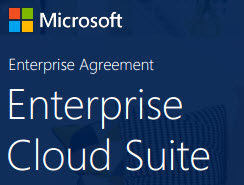Microsoft to make per-user Windows licensing available to enterprise customers

Microsoft is taking another step toward subscription licensing, this time with Windows.

The company is offering its enterprise users a new per-user, rather than per-device, licensing option for Windows 7 and Windows 8 enterprise customers. A new Enterprise Cloud Suite (ECS) bundle -- including Office 365 E3, Enterprise Mobility Suite (EMS) and a new Windows Software Assurance per User license -- is a new volume-licensing option that will be available to Microsoft volume-licensing users starting December 1.
The brand-new piece of ECS is the per-user Windows licensing option. That option allows volume licensees to "user-fy" a Windows per-device license. That way, a single individual gets the rights to access a virtual desktop infrastructure (VDI) from any device, as well as to install and run Windows 7 or Windows 8 Enterprise on multiple devices. It's basically a new licensing option layered on top of the existing per-device model, explained Directions on Microsoft's Rob Horwitz.
Forrester Research described the per-user subscription licensing (USL) option for Windows as "significant, and good, news for its customers."
"It marks a major change in Microsoft’s attitude to bring-your-own-device (BYOD) programs involving non-Windows devices such as Apple Macs and Android tablets," said Forrester's Duncan Jones in a blog post outlining the change.
Read this
As Microsoft explains in its downloadable fact sheet about ECS, via the new Windows Software Assurance per User licensing option, "all of the user's devices are covered through Windows Software Assurance per User, including those running iOS and Android operating systems," and "only the user's primary work PC needs to be running a qualified operating system," like Windows Pro.
Though it's fairly complex to describe the new per-user option (it wouldn't be a Microsoft licensing discussion without complexity), the new per-user option actually will help simplify how enterprise users license software, said Horwitz. He said the new option will help clean up Microsoft's current VDI licensing approach, which has "made it impossible for many customers to be fully license compliant."
"Under traditional desktop Enterprise Agreements (EAs), customers buy three things—Client Access License (CAL) suites (for server products), the Office suite, and/or Windows Enterprise Upgrades—across their 'entire organization,' which could mean all 'qualified devices' or 'qualified users.' While CAL suites and Office have offered customers the flexibility to choose to count devices or users, Windows did not," explained Horwitz.
"The addition of Windows per-user licensing means customers can now purchase all three EA components on a per-user basis, so no more counting both apples AND oranges, so to speak. The significance—this could simplify agreement administration and might at some point reduce overall licensing costs for some customers (if they have fewer users than devices)," he said.
Horwitz noted that Microsoft still hasn't communicated specific pricing and transition details, so it's impossible to say definitively that the new option will benefit users cost-wise.
A few more resources for those attempting to decipher the ins and outs of the new Windows per user option:
Directions on Microsoft webinar on the new licensing plan on November 13. (Registration: https://www1.gotomeeting.com/register/449435705). This topic will also will be covered in depth in Directions on Microsoft's upcoming licensing boot camps, with the next being in Seattle December 8-9.
Forrester Research report: "Quick Take: Microsoft Cleans Windows Licensing And Reveals A Path To VDI" (Available for purchase by non-clients for $199; free to clients.)
Free 10-minute video on the new Windows SA per User license plan from Louise Ulrick at the Licensing School.
The SHI blog: "How Microsoft Enterprise Cloud Suite licensing affects you" (from Microsoft reseller SHI International).